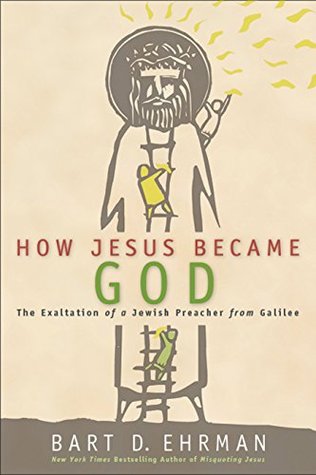More on this book
Community
Kindle Notes & Highlights
Started reading
January 20, 2019
I am no longer a believer. Instead, I am a historian of early Christianity,
As a historian I am no longer obsessed with the theological question of how God became a man, but with the historical question of how a man became God.
early Gospels of Matthew, Mark, and Luke—in which Jesus never makes explicit divine claims about himself—portray Jesus as a human but not as God,
Gospel of John—in which Jesus does make such divine claims—does indeed portray him as God.
Instead,
religion was all about action—what one did in relation to the gods, rather than what one happened to think or believe about them.
Cynic philosophers were adamant that you shouldn’t live for the “good things” in life. You shouldn’t care what you possess, what you wear, or what you eat. You shouldn’t care for anything, in fact, that is external to you, anything that is ultimately beyond your ability to control.
A great general, a king, an emperor, a great philosopher, a fantastic beauty—these could be more than human. Such people could be superhuman. They could be divine. Maybe their father was a god. Maybe they were a god temporarily assuming a human body. Maybe because of their own virtue, power, or physical features they were thought to have been accepted into the divine realm.
that a great chasm exists between the human and divine realms—and assuming that this view was in place during the early days of the Christian movement.
Christianity over the past two centuries is that the followers of Jesus, during his life, understood him to be human through and through, not God. People saw Jesus as a teacher, a rabbi,
prophet.
Monotheism is the view that
there is, in fact, only one God. Henotheism is the view that there are other gods, but there is only one God who is to be worshiped.
God does not have direct contact with the world of matter; his contact with the world is by means of his Logos. God does not speak directly to us; he speaks to us through his Logos.
someone decides to believe, there could be a fantastic reward if he is right and no real downside if he is wrong.
if he decides not to believe, no real benefits come from the decision, but there could be very real and harmful downsides (such as eternal punishment).
even though the chances of being right may be remote, it is better to belie...
This highlight has been truncated due to consecutive passage length restrictions.
if I believe in Christ, I could experience enormous benefits if it turns out that Christ really is the Son of God who brings salvation, and no downside if he is not; but if I choose not to believe, I could face enormous (eternal) bad consequences, with no upside. So it is better to believe than not to believe.
Christianity has long been an exclusivistic religion—meaning
many different kinds of Christians, some of whom claim that if you do not adopt their particular version of the faith, you cannot be saved.
Deciding who was right and who was wrong, and what views were true and what views were false, became an overpowering concern among the Christian leaders.
discerning right and wrong beliefs—ascertaining what was “orthodox” (right) and “heretical” (false)—became an obsession of many of the leaders of the early church.
the word orthodoxy means right belief. The word heresy literally means a choice—that is, a choice not to believe the “right belief.” A synonym for heresy is heterodoxy, which literally means different belief—that is, different from the belief that is “right.”
The side that eventually won the most converts and decided what Christians should believe is called “orthodox,” because it established itself as the dominant view and thus declared it was right. A “heresy” or a “heterodoxy,” from a modern historical perspective, is simply a view that lost the debate.
to make them conform more closely with orthodox theological interests. Certain heterodox scribes may have done the same, but among our surviving manuscripts


